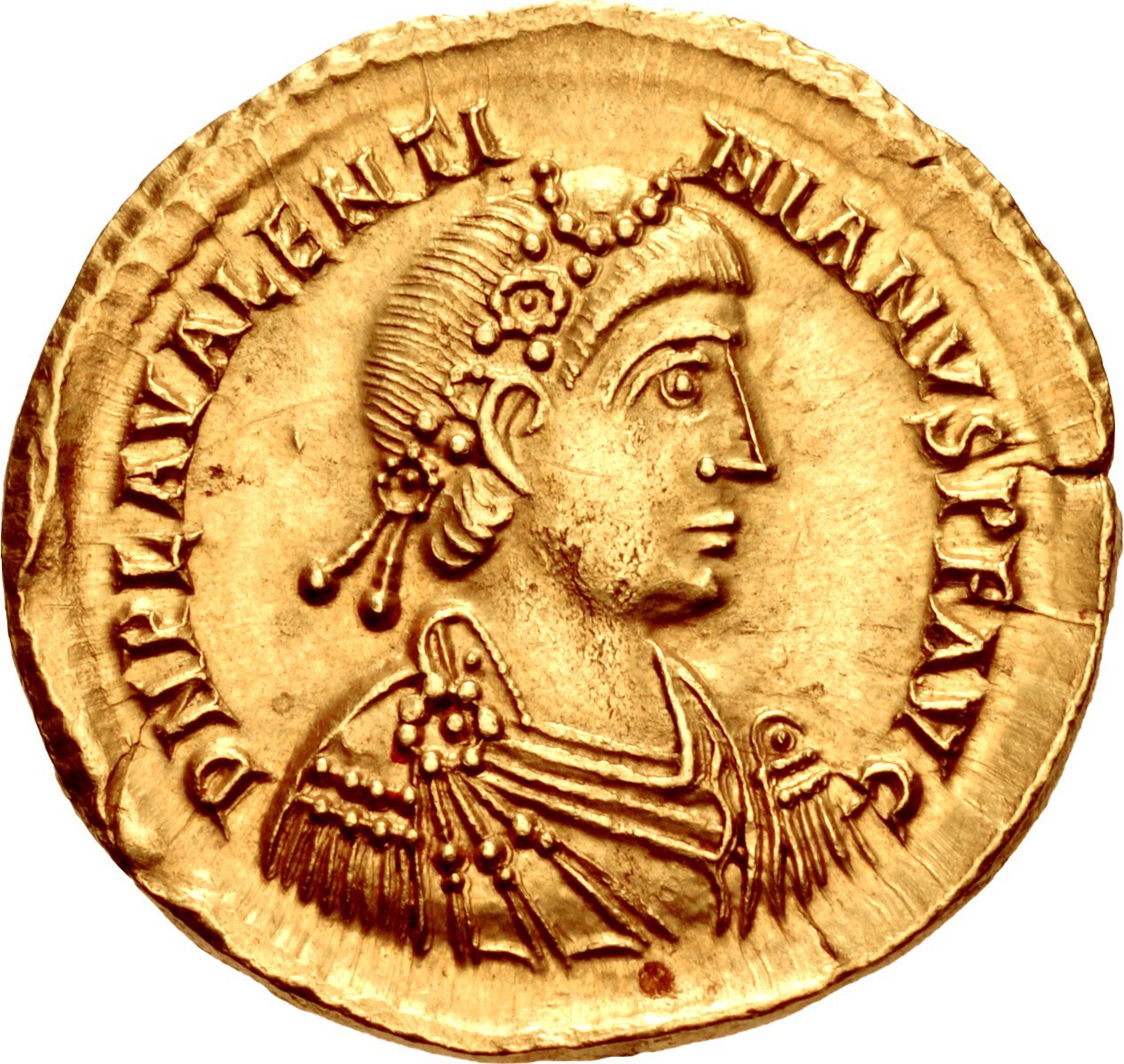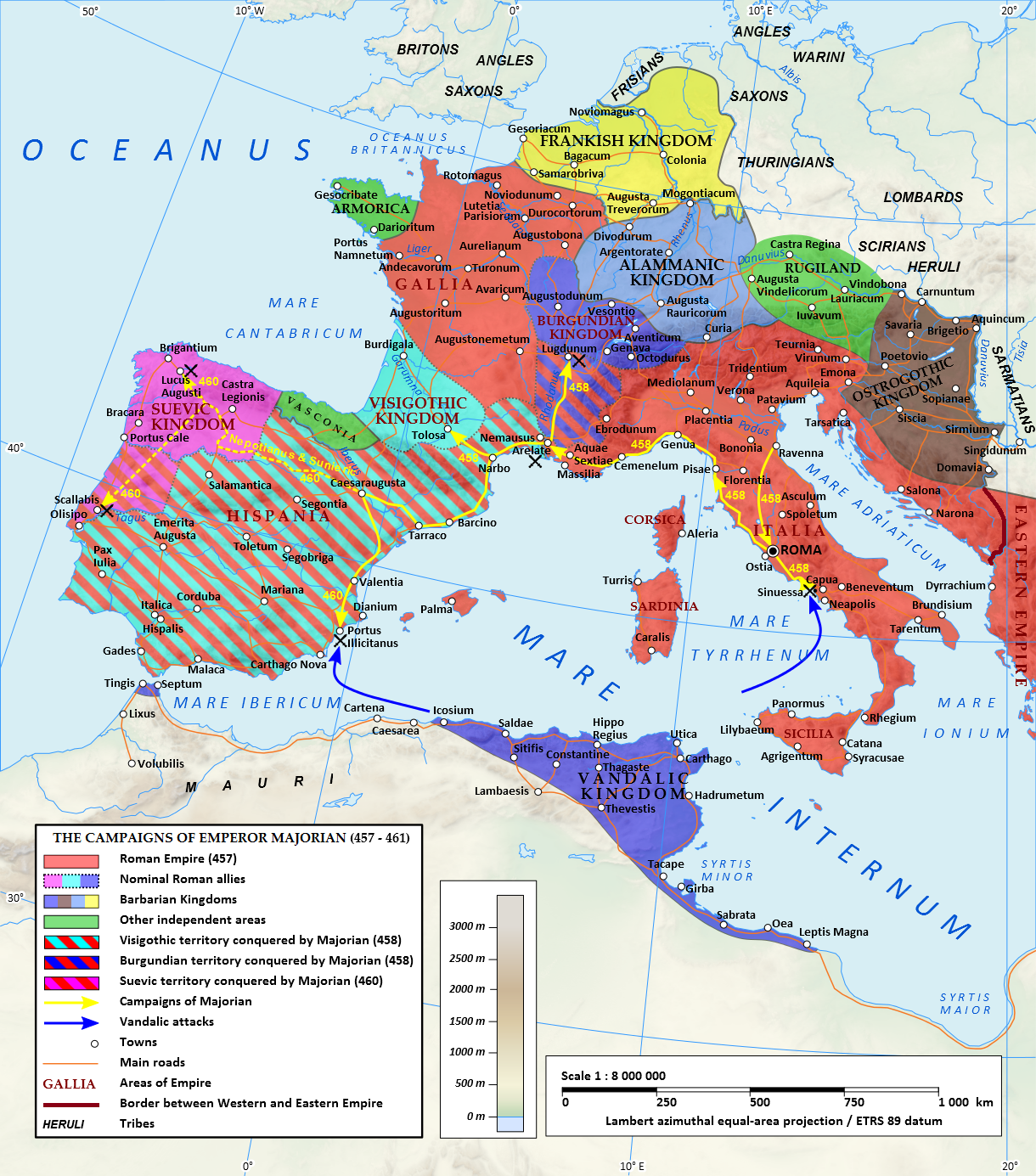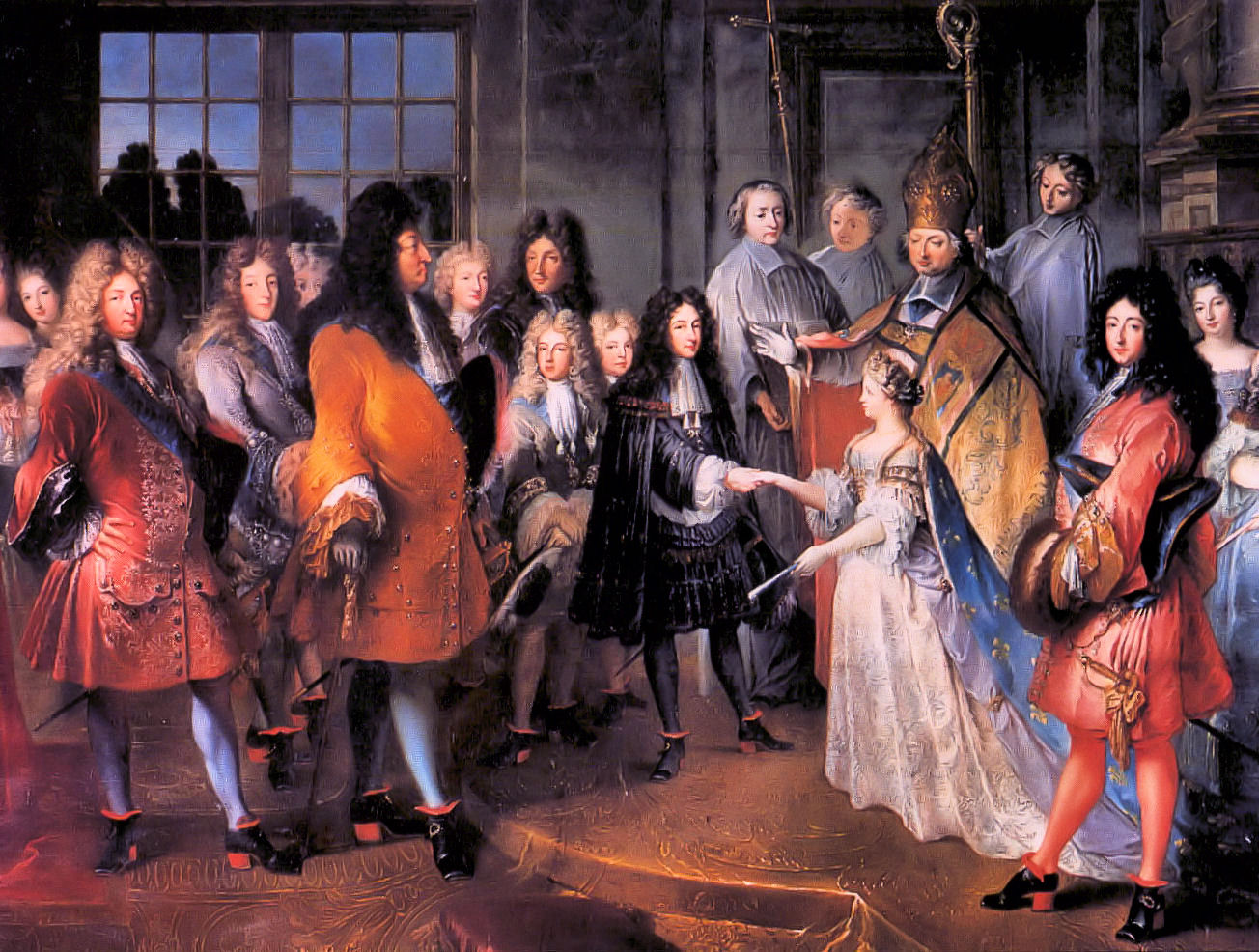|
Flavius Ricimer
Flavius Ricimer ( , ; – 18/19 August 472) was a Romanized Germanic general who effectively ruled the remaining territory of the Western Roman Empire from 461 until his death in 472, with a brief interlude in which he contested power with Anthemius. Deriving his power from his position as '' magister militum'' of the Western Empire, Ricimer exercised political control through a series of puppet emperors. Ricimer's military office and his dominance over the empire led some historians to conclude that he was a link between previous ''magistri militum'', such as the Vandal Flavius Stilicho, and the dux of Italy, Flavius Odoacer. Lineage The date of Ricimer's birth is unknown. Some scholars have dated it as late as the early 430s, which would have made him unusually young when he rose to power. A birthdate of around 418 is more likely. The names of his parents are also unknown. In his panegyric to Anthemius, given in 468, the poet Sidonius Apollinaris claimed that Ricimer w ... [...More Info...] [...Related Items...] OR: [Wikipedia] [Google] [Baidu] |
Labarum
The labarum ( el, λάβαρον) was a ''vexillum'' (military standard) that displayed the "Chi-Rho" symbol ☧, a christogram formed from the first two Greek letters of the word "Christ" ( el, ΧΡΙΣΤΟΣ, or Χριστός) – ''Chi'' (χ) and ''Rho'' (ρ). It was first used by the Roman emperor Constantine the Great. Ancient sources draw an unambiguous distinction between the two terms "labarum" and "Chi-Rho", even though later usage sometimes regards the two as synonyms. The name labarum was applied both to the original standard used by Constantine the Great and to the many standards produced in imitation of it in the Late Antique world, and subsequently. Etymology Beyond its derivation from Latin ''labarum'', the etymology of the word is unclear. The Oxford English Dictionary offers no further derivation from within Latin. Some derive it from Latin /labāre/ 'to totter, to waver' (in the sense of the "waving" of a flag in the breeze) or ''laureum exillum' ("laurel st ... [...More Info...] [...Related Items...] OR: [Wikipedia] [Google] [Baidu] |
Suebi
The Suebi (or Suebians, also spelled Suevi, Suavi) were a large group of Germanic peoples originally from the Elbe river region in what is now Germany and the Czech Republic. In the early Roman era they included many peoples with their own names such as the Marcomanni, Quadi, Hermunduri, Semnones, and Lombards. New groupings formed later, such as the Alamanni and Bavarians, and two kingdoms in the Migration Period were simply referred to as Suebian. Although Tacitus specified that the Suebian group was not an old tribal group itself, the Suebian peoples are associated by Pliny the Elder with the Irminones, a grouping of Germanic peoples who claimed ancestral connections. Tacitus mentions Suebian languages, and a geographical "Suevia". The Suevians were first mentioned by Julius Caesar in connection with the invasion of Gaul by the Germanic king Ariovistus during the Gallic Wars. Unlike Tacitus he described them as a single people, distinct from the Marcomanni, within the larg ... [...More Info...] [...Related Items...] OR: [Wikipedia] [Google] [Baidu] |
Theodoric II
Theodoric II, ''Teodorico'' in Spanish and Portuguese, ( 426 – early 466) was the eighth King of the Visigoths, from 453 to 466. Biography Theoderic II, son of Theodoric I, obtained the throne by killing his elder brother Thorismund. The English historian Edward Gibbon writes that "he justified this atrocious deed by the design which his predecessor had formed of violating his alliance with the empire." In late 458 the Western Roman Emperor, Majorian entered Septimania to attack Theodoric and reclaim the province for the empire. Majorian defeated Theodoric at the Battle of Arelate, forcing the Visigoths to abandon Septimania and withdraw west to Aquitania. Under the new treaty with the Romans, the Visigoths had to relinquish their recent conquests in Hispania and return to federate status. However, after the assassination of Majorian in 461, Theodoric recaptured Septimania and invaded Hispania again. Theodoric sided with Ricimer and the new emperor Libius Severus against Majori ... [...More Info...] [...Related Items...] OR: [Wikipedia] [Google] [Baidu] |
Petronius Maximus
Petronius Maximus ( 39731 May 455) was Roman emperor of the West for two and a half months in 455. A wealthy senator and a prominent aristocrat, he was instrumental in the murders of the Western Roman ''magister militum'', Aëtius, and the Western Roman emperor, Valentinian III. Maximus secured the throne the day after Valentinian's death by ensuring the backing of the Senate and by bribing the palace officials. He strengthened his position by forcing Valentinian's widow to marry him and forcing Valentinian's daughter to marry his son. He cancelled the betrothal of his new wife's daughter to the son of the Vandal king Genseric. This infuriated both his stepdaughter and Genseric, who sent a fleet to Rome. Maximus failed to obtain troops from the Visigoths and he fled as the Vandals arrived, became detached from his retinue and bodyguard in the confusion, and was killed. The Vandals thoroughly sacked Rome. Early career Petronius Maximus was born about 397. Although he was of ... [...More Info...] [...Related Items...] OR: [Wikipedia] [Google] [Baidu] |
Valentinian III
Valentinian III ( la, Placidus Valentinianus; 2 July 41916 March 455) was Roman emperor in the West from 425 to 455. Made emperor in childhood, his reign over the Roman Empire was one of the longest, but was dominated by powerful generals vying for power amid civil wars and the invasions of Late Antiquity's Migration Period, including the campaigns of Attila the Hun. He was the son of Galla Placidia and Constantius III, and as the great-grandson of Valentinian I () he was the last emperor of the Valentinianic dynasty. As a grandson of Theodosius I (), Valentinian was also a member of the Theodosian dynasty, to which his wife, Licinia Eudoxia, also belonged. A year before assuming the rank of ''augustus'', Valentinian was given the imperial rank of ''caesar'' by his half-cousin and co-emperor Theodosius II (). The '' augusta'' Galla Placidia had great influence during her son's rule. During his early reign Aetius, Felix, and the ''comes africae'', Bonifacius all competed ... [...More Info...] [...Related Items...] OR: [Wikipedia] [Google] [Baidu] |
Majorian
Majorian ( la, Iulius Valerius Maiorianus; died 7 August 461) was the western Roman emperor from 457 to 461. A prominent general of the Roman army, Majorian deposed Emperor Avitus in 457 and succeeded him. Majorian was the last emperor to make a concerted effort to restore the Western Roman Empire with its own forces. Possessing little more than Italy, Dalmatia, and some territory in northern Gaul, Majorian campaigned rigorously for three years against the Empire's enemies. His successors until the fall of the Empire, in 476–480, were actually instruments of their barbarian generals, or emperors chosen and controlled by the Eastern Roman court. After defeating a Vandal attack on Italy, Majorian launched a campaign against the Visigothic Kingdom in southern Gaul. Defeating king Theodoric II at the Battle of Arelate, Majorian forced the Goths to abandon their possessions in Septimania and Hispania and return to federate status. Majorian then attacked the Burgundian Kingdom, d ... [...More Info...] [...Related Items...] OR: [Wikipedia] [Google] [Baidu] |
Comes Domesticorum
The origins of the word ''domesticus'' can be traced to the late 3rd century of the Late Roman army. They often held high ranks in various fields, whether it was the servants of a noble house on the civilian side, or a high-ranking military position. After serving under the emperor for a certain duration, the Domestici would be able to become leaders themselves and potentially command their own regiment of legionaries in the military. Relatively, the most important offices were the “Comes Domesticorum” also known as, “Commander of the Protectores Domestici,” and “Comes rei Militaris” or General. Origin The domestici rose to prominence during the Crisis of the 3rd Century, the myriad of societal catastrophes nearly led to the collapse of the Roman Empire. The accession of Diocletian and his subsequent reforms ended the continual strife and unstable leadership Ancient Rome had faced during this period. The title of “Domesticus” was developed to advocate for bette ... [...More Info...] [...Related Items...] OR: [Wikipedia] [Google] [Baidu] |
Flavius Aetius
Aetius (also spelled Aëtius; ; 390 – 454) was a Roman general and statesman of the closing period of the Western Roman Empire. He was a military commander and the most influential man in the Empire for two decades (433454). He managed policy in regard to the attacks of barbarian federates settled throughout the West. Notably, he mustered a large Roman and allied (''foederati'') army in the Battle of the Catalaunian Plains, ending a devastating invasion of Gaul by Attila in 451, though the Hun and his subjugated allies still managed to invade Italy the following year, an incursion best remembered for the ruthless Sack of Aquileia and the intercession of Pope Leo I. Aetius has often been called, "Last of the Romans". Edward Gibbon refers to him as "the man universally celebrated as the terror of Barbarians and the support of the Republic" for his victory at the Catalaunian Plains. J.B Bury notes, "That he was the one prop and stay of the Western Empire during his life time ... [...More Info...] [...Related Items...] OR: [Wikipedia] [Google] [Baidu] |
List Of Kings Of Burgundy
The following is a list of the kings of the two kingdoms of Burgundy, and a number of related political entities devolving from Carolingian machinations over family relations. Kings of the Burgundians * Gebicca (late 4th century – c. 407) *Gundomar I (c. 407 – 411), son of Gebicca *Giselher (c. 407 – 411), son of Gebicca *Gunther (c. 407 – 436), son of Gebicca ''Flavius Aëtius moves the Burgundians into Sapaudia ( Upper Rhône Basin)''. * Gunderic/Gundioc (436–473) opposed by **Chilperic I, brother of Gundioc (443–c. 480) *division of the kingdom among the four sons of Gundioc: **Gundobad (473–516 in Lyon, king of all of Burgundy from 480), **Chilperic II (473–493 in Valence) **Godomar I (473–486 in Vienna) **Godegisel (473–500, in Vienne and Geneva) *Sigismund, son of Gundobad (516–523) *Godomar or Gundimar, son of Gundobad (523–534) Burgundy under Frankish kings ''Gradually conquered by the Frank ... [...More Info...] [...Related Items...] OR: [Wikipedia] [Google] [Baidu] |
Gondioc
Gondioc (died 473), also called ''Gunderic'' and ''Gundowech'', was a King of the Burgundians, succeeding his putative father Gunther in 436. In 406, the Burgundians under King Gundahar (Gundihar, Guntiar) at Mainz had crossed the Rhine and then settled with the permission of the Roman emperor Honorius on the Rhine. Gundahar's violent attempts to expand his empire to the west brought the Burgundians into conflict with the Romans 30 years later. In 435, a Burgundian army was defeated by Hunnic auxiliary troops under the Roman Aetius and finally destroyed. The Burgundian capital Worms was destroyed by the Huns. Most of the surviving Burgundians joined the Romans as auxiliary troops under their new King Gondioc. Aetius settled them in 443 as ' 'foederati' ' in western Switzerland and the Sapaudia (today's Savoy) as a buffer against the growing strength of the Alamanni. This settlement was the beginning of a Burgundian kingdom, with its capital at Geneva. In 451, Gondioc joi ... [...More Info...] [...Related Items...] OR: [Wikipedia] [Google] [Baidu] |
Marriage Alliance
A marriage of state is a diplomatic marriage or union between two members of different nation-states or internally, between two power blocs, usually in authoritarian societies and is a practice which dates back into ancient times, as far back as early Grecian cultures in western society, and of similar antiquity in other civilizations. The fable of Helen of Troy may be the best known classical tale reporting an incidence of surrendering a female member of a ruling line to gain peace or shore up alliances of state between nation-states headed by small oligarchies or acknowledged royalty. Europe While the contemporary Western ideal sees marriage as a unique bond between two people who are in love, families in which heredity is central to power or inheritance (such as royal families) often see marriage in a different light. There are often political or other non-romantic functions that must be served, and the relative wealth and power of the potential spouses are considered. Marria ... [...More Info...] [...Related Items...] OR: [Wikipedia] [Google] [Baidu] |
Hermegarius
Heremigarius (also Hermigarius or Hermegarius) ( fl. 427–428) was a Suevic military leader operating in Lusitania in the early fifth century. He may have been a joint monarch with Hermeric or his successor, but no primary source directly attests it.Thompson, 166. German historian Felix Dahn, in his monumental ''Die Könige der Germanen'', entertained the possibility that he was a relative of and successor to Hermeric. Writing in the mid-seventh century, Fredegar calls Heremigarius ''rex Suaevorum'', king of the Suevi. According to Hydatius, a contemporary source, Heremigarius had attacked the Vandal-controlled cities of Seville and Mérida and committed an unspecified offence (''iniuria'') against the Basilica of Saint Eulalia. He was thus "cast down in the river Ana by the arm of God," where he drowned. He was in fact defeated in battle by the Vandal king Geiseric near Mérida and drowned during the retreat. Recently, Casimiro Torres, in ''Galicia Sueva'', argued that Heremig ... [...More Info...] [...Related Items...] OR: [Wikipedia] [Google] [Baidu] |

.png)





